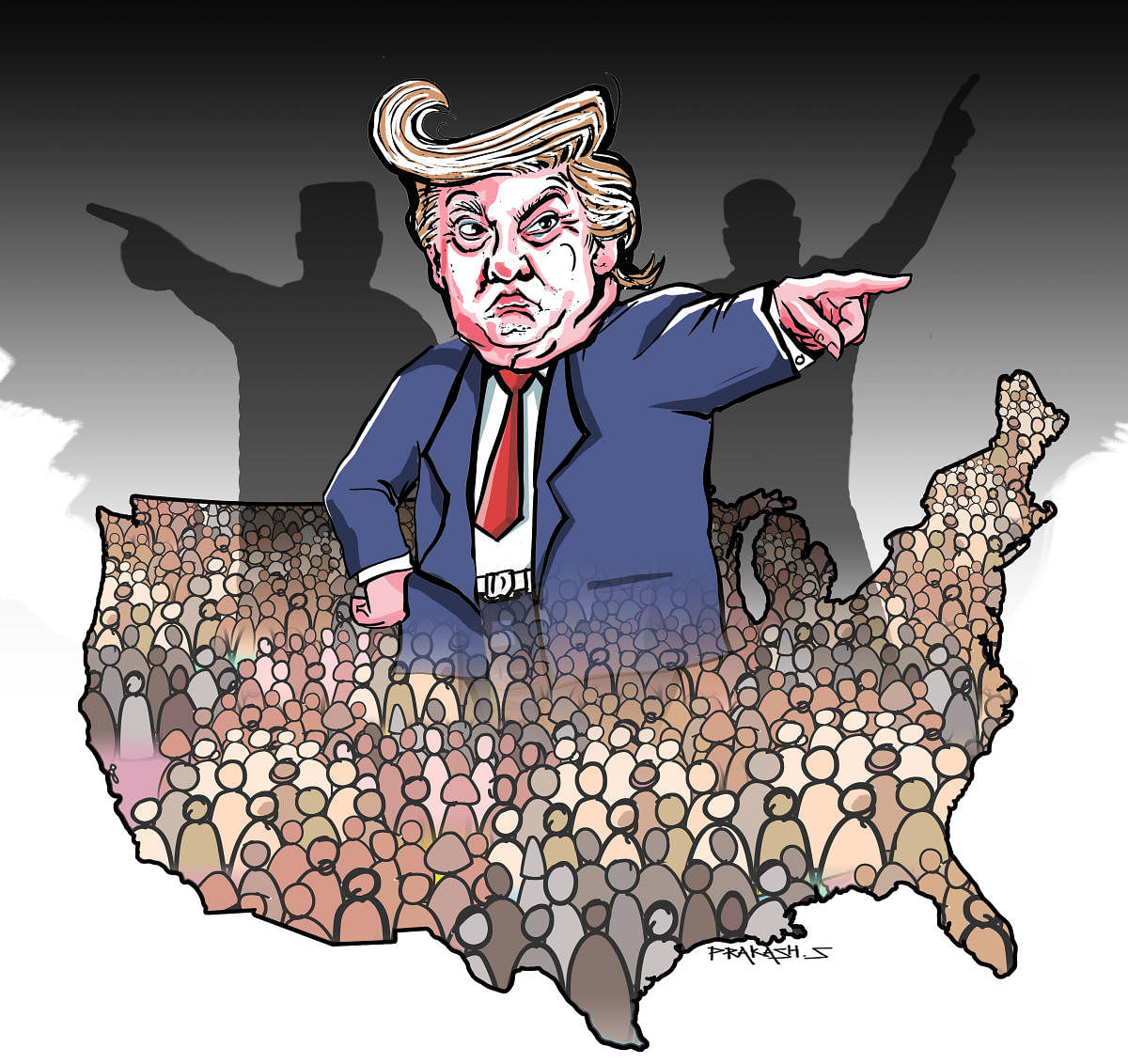
Today’s politicos stoking racism is a definitive threat for the future of globalism and welfare economics. If we all were to go back to our places of origin as many would have it, well, it would be a long march to Africa.
“When nations fail growth, jobs, healthcare, education and human rights, rulers divert attention from the jobless, farmers’ plight and students’ angst, often targeting migrants,” says linguist and thinker G N Devy.
President Trump telling the Congresswomen to go back to their countries and our newly-elected MP Tejasvi Surya pushing for a register of citizens in Bengaluru, must be read together as part of a global loathing for the stateless. Both instances are eerily similar. Not to mention the detention centre for ‘illegals’ being readied in the city.
“Since both India and the US are in the hands of the extreme right, it is not surprising that they are following parallel paths. President Trump stands apart for his obnoxious views. His rant against the four Congresswomen, the triumphant look when the crowd chanted ‘send them back’ are hard to beat,” notes novelist Shashi Deshpande.
The Union government’s priorities must be focused elsewhere, not in a futile exercise of counting citizens, wasting the taxpayers’ money. It is far worse when certain politicians are accused of using the urban stateless to benefit in elections, providing them fake identities — allegations against a rebel Congress MLA notwithstanding.
In the process, people refuse to leave their homes to safety in the time of a deluge in Assam, fearing they would lose citizenship.
“Our young South Bangalore MP talking of NRC, is perhaps because of his youth, his inexperience and his hurry to catch the eye of the top leaders. The idea of a detention camp is shocking,” says Deshpande.
“The anti-migrant stance is reflected subtly in the world bodies too. In a 2016 report, the UN warned nearly 35% of the world’s workforce is migratory, and it would be ‘necessary’ to check this,” G N Devy adds.
According to Devy, the sub-continent flourished on social permeability and ethnic, religious and linguistic diversity. “The present dispensation that thinks it understands India better, is altering the nation’s character, depleting the social and cultural traditions of a tolerant, diverse and humane civilisation,” he warns.
Dehumanising the stateless is in fact a cheap and dirty parlour trick. It shall never benefit greater civilisational progress that stems from cultural assimilation of peoples. It is indeed challenging the digital ‘melting pot’ of cultures of the day. Obviously, it fits the storyboard when divisive gains are to be made.
“This global context encourages nations, known as ‘liberal’ democracies a decade ago, to turn extreme right. Migrants are a minuscule percentage of a population. The talk of driving them out for ‘purifying’ the country is non-offending to the glib majority. Basava and Akkama make us proud with humanity as their primary principle. Today, that is sought to be reversed and vandalised,” Devy explains.
There are no ‘illegal’ immigrants. There are only ‘illegal’ governments, if one were to profoundly reflect on the ethics of what is at play.
“The Right forced the Rohingyas to stay within a regime with an appalling human rights record, at home drawing a dividing line between the people of the North East and Bengal by over-stressing the ‘need to force migrants out’. This is anti-humanitarian, short-sighted and socially divisive. If hatred is the sentiment that feeds policy, India will soon be a lonely Big Brother in South Asia,” feels Devy.
Once, migrants were cheap labour. Highly sought-after to build the nation states of the West. They literally helped lay the foundation for the now omnipresent neoliberalism of post-war Europe. But disregard, fear and loathing of this floating world populace that is in fact doing all the dirty laundry, has to be acknowledged nevertheless.
Devy puts this very fact in perspective: “Post-war Europe needed labour, so they liberalised migration collecting Algerians and Indonesians in France, Mexicans in Spain, Asians and Africans in Germany, the UK and northern Europe. After the Brixton riots in the 70s, an anti-migrant wave gripped France. It suited the US in cold war to be a ‘melting pot’ of peoples. However, after the Berlin Wall fell, US adopted stringent standards for visas. The anxiety over migration from erstwhile USSR led to the return of the Right in Germany, the Netherlands and France. Now, Europe sees unabashed statements against migration, especially against the Syrian refugees. Donald Trump has made the wall between Mexico and the US his domestic policy. Since 2014, Australian government has been sending erring migrants to an island camp.”
When cheap human resources are no longer required in the gig economy, the stateless are reduced to pawns.
“Just as the USA cannot forget that the country was built by migrants – India cannot speak of Muslims as ‘outsiders’, or deny their contribution to the culture and the multiplicity which has been our strength. And, is there even enough money to build a detention facility? After all, we need to save our money to keep our ‘rebels’ in five-star resorts in times of crisis,” ponders Deshpande.